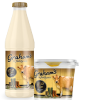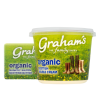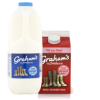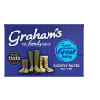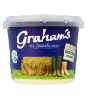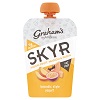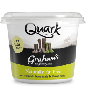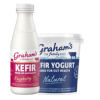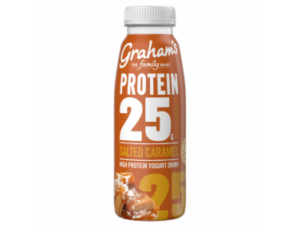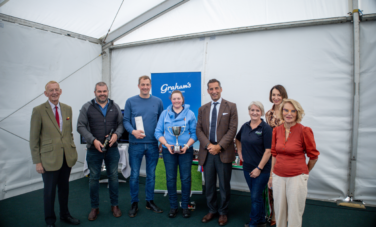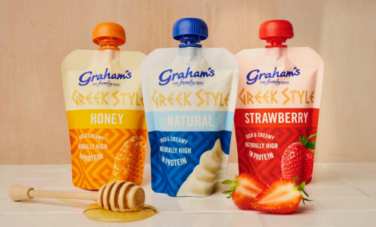
Seventy five years ago Robert Graham set himself up as a tenant farmer on the outskirts of Bridge of Allan milking cows by hand anddelivering his products by horse and cart to customers in the village.
Graham, who had 112 acres and 12 Ayrshire and British Friesian cows, had moved from the Carse of Stirling where his father was also a farmer.
Fast forward to 2014 and although there are still Jersey and Limousin cows in the fields around the farm there is also a state-of-the-art dairy run by his grandson Robert though the founder’s son, another Robert, is also still involved in the business.
To complete the family picture the founder’s grand-daughter, Carol, oversees marketing at the business which now has turnover of nearly £85m and some 490 employees.
Indeed Graham’s the Family Dairy has grown in excess of 20 per cent per annum for 15 years. Milk accounts for some 75 per cent of its turnover and the company has another dairy at Nairn and distribution sites in Wick, Glasgow, Fife, Angus and Aberdeen.
Not only is it Scotland’s biggest independent milk producer but it recently overtook Danish rival Lurpak as the country’s bestselling butter producer.
The headquarters of the company is in the former farmhouse where the founder’s son was born in 1940.
So it perhaps comes as no surprise Robert junior is clearly proud of his farming roots and his work ethic is very much based around that. “My grandfather was a tenant farmer and worked very hard and that is my expectation of myself and my expectation of people within the business,” says 43-year-old Graham.
When he joined the business in 1991 he and his father would get up at 3.45am and go to the dairy to start packing milk. “My dad would run the filling line and myself and another guy would stand at the other end taking the milk off and putting it into crates. If a driver didn’t turn up for work I would take the van out. I would be first call for a driver if someone didn’t turn up.
“The farmers that supply us get up every morning no matter what day it is including Christmas Day to milk their cows. All of that has to be remembered.”
Graham admits he had no masterplan as a young man. He studied accountancy at Heriot-Watt University because he liked numbers and then decided to join the family business. “I think my parents got quite a fright when I pitched up. Ithink they were quite surprised.”
Graham and his father came up with a strategy for growing the business by going into neighbouring towns and selling milk. “We went to Allo, then Falkirk, Cumbernauld, Perth and Dunfermline. We bought a few businesses in the mix as well”
In 1996 Graham junior was appointed as managing director and his father became chairman of the company. By 1997 it was supplying 14 million litres of milk to wholesale and retail outlets across Scotland with the largest proportion going to independent shops.
The following year Robert Graham Snr decided to buy some Jersey cows once owned by the Queen in Windsor and they later became a key part of the business.
In 2000 it started delivering milk to supermarkets and was also voted Best Dairy Company in Scotland.
By 2002 it had sales of £12m a year and had launched a premium range of cream, butter, Jersey milk and organic products. The following year it embarked on a £1m expansion project upgrading its processing and packaging plant at Bridge of Allan and completed its 19th acquisition with the purchase of Stevenson Dairy Farm in Cumnock, Ayrshire.
In 2006 the firm undertook a major rebranding exercise, headed by Carol, focusing on the family angle with the ‘Graham’s The Family Dairy’ logo.
Robert Graham says the rebrand has been a big part of the company’s success but admits he and his father were sceptical at the time. “It was something my dad and I didn’t want to do,” he says. “Why spend all this money on rebranding?
“It is the best thing we have ever done. I think Carol understood that as a business we weren’t telling our story very well. And that is what our branding does. What we had before was just a logo.”
The company went a stage further last year when it launched its first TV advertising campaign featuring all the members of the family and its Jersey cows.
Today it covers all of Scotland with its milk deliveries. “Half our business is supermarkets and multiples and the other half is what we call multi-drop, which is a wide variety of food service and retail customers. We make about 6000 deliveries a day, every day across Scotland to all types of customers.
It could be hotels, coffee shops, restaurants, universities or schools.” Graham says his company deals with all the main supermarket chains to differing degrees.
Butter production started on a very small scale at Bridge of Allan but now the company has overtaken Lurpak as being the biggest selling block butter in Scotland. The reason it went into butter production originally was it generated cream and the Grahams simply thought it was a good way of adding value to the business.
Robert believes it has been successful because all of its butter is made from fresh cream whereas other butters are often made from frozen butter that is reworked or butter that has been brought in from somewhere else. “We know where our butter comes from,” he says. “It comes from fresh cream which is churned here. And we know what we are doing.”
He also has plans to grow the range. “There is lots to be done on spreadables so our new product development for next year will be heavily based around launching new spreadables. We currently do two. We will be launching lighters and unsalted and organic.”
The family also have about 280 Jersey cows on 750 acres at their own cattle farm and the milk goes into Graham’s Gold. “That has been a phenomenal growing indulgent area. It has done really well for us. We sell it through pretty much all retailers across the whole of the UK.”
Ice cream products were launched in 2011 and Graham says that is also doing well. The company currently has seven flavours and its biggest sellers are vanilla and mint choc chip followed by raspberry ripple.
“We sell it through supermarkets but also through multi-drop customers as well,” he says. “We have a great product and it is part of our whole strategy for extending our range.”
Last year it launched its first ever cheese products – mild red cheddar, mature white cheddar and extra mature white cheddar. The cheese is produced in its Nairn dairy and Graham says it is growing well.
The UK cheese category is worth £2.5bn and growing 2.9 per cent year on year, with cheddar accounting for more than 50 per cent of the market. “It is a big category and there is lots to go for,” says Graham.
He also says he would like the company to do yoghurt but it has to look after all the products that it already makes.
About ten per cent of its turnover goes to England and although Graham would like to see that grow he thinks there is a lot more to go at in Scotland. “I know a lot of people talk about exports but I think when you read a story about food companies when you actually see the number often it is quite small,” he says. “And I think particularly for dairy there is a huge amount of opportunity just in import substitution. We have got stacks of butters and yoghurts all coming in from outside the UK let alone Scotland.”
Graham has focused on the quality end of the market and went into organic very early. Its bestselling line is two litre semi-skimmed milk. “If you go into any supermarket if it is not the biggest it will certainly be in the top three selling ranges,” he says.
Some years ago the firm had its own shops but it no longer has. Graham has considered setting up a shop at its Boquhan Home Farm but says everything has to fight for capital expenditure. “We like the idea of it but it is not near the top of the list for capital expenditure in any form,” he says.
Recently the business moved its banking to the Royal Bank of Scotland after agreeing £20m of funding support from RBS and its asset finance arm, Lombard, to enable it to continue its expansion. “There was obviously a lot of interest in us but RBS came up with a very professional, very good process and it has been a great move for us,” says Graham. “It will hopefully allow us to achieve our ambitions.”
Graham has good things to say about Scottish Goverment support for his own company and the food and drink industry as a whole. “Yes, the government has been good. It has brought in a food and drink strategy and it is one of our key industries. It has supported the industry and our business with grants for some of our capital expenditure and to help launch new products and help capacity and different things like that.”
“We have got a great food and drink industry and great primary products. We have got some great innovative companies. We have got good products and great stories.”
Together with fellow food business Scotbeef Grahams is one of the biggest employers in Bridge of Allan with 270 working at the dairy.
Graham still lives in Bridge of Allan and says it has been a good location for the business with both Edinburgh and Glasgow close by.
He believes a family-run business is a great model. “It has accountability. It has integrity. It has purpose. I feel a responsibility for people working in the business and the farmers who supply the business.
“We can make our own decisions and make them quickly,” he says.
“We have big mega competitors like Arla and Muller Wiseman so we have to be innovative and be quick. We need to want it.”
Although it is very much a familyrun business it has not been averse to bringing in non-family advisors. Simon Thomson, chief executive of oil and gas exploration group Cairn Energy, was the first non-family member to join the board as a nonexecutive director and it has since also recruited the former managing director of Robert Wiseman Dairies, Billy Keane, as a non-executive director. Keane left Wiseman with other directors nine months after it was taken over by Muller, the German-based dairy giant.
Graham says Keane will help the firm realise its ambitious plans to grow its market share. At the time of his appointment Keane, who is also the chairman of trade body Dairy UK, said: “Although market competitors for many years, I always held great admiration for the Graham’s business and its traditional family values.”
Many decisions by Graham and his colleagues are made on “feel”. “Obviously data and numbers are important but actually we make a lot of decisions, even investment decisions, on ‘feel’ and relatively simple calculations because I think we know our business pretty well.”
Decisions on new products are partly based on looking at what other people are doing and what its customers are asking it to do. And, of course, “feel”. “We are very hands on. We have grown up with this business since there were 17 people in it.
“We farm and so we have high expectations of ourselves for starters and then obviously high expectations of anyone working for the business.
“I think it is about achieving things. The work ethic, intensity, purpose, looking after customers is what is important to me. Our farming and family foundations are the foundations of how this business is run.”
Robert senior is still very much involved in the business, especially with matters around production, and is also always there to bounce ideas off. “He effectively built a dairy – he designed it and he has seen it all. It would take quite a lot for someone to tell him something he didn’t know about dairies.”
When not working Graham likes to spend time with his family. He has two children Holly, aged eight, and Douglas, six. Obviously it is impossible to know whether they will eventually join the business but Douglas already likes coming to seethe cows.

